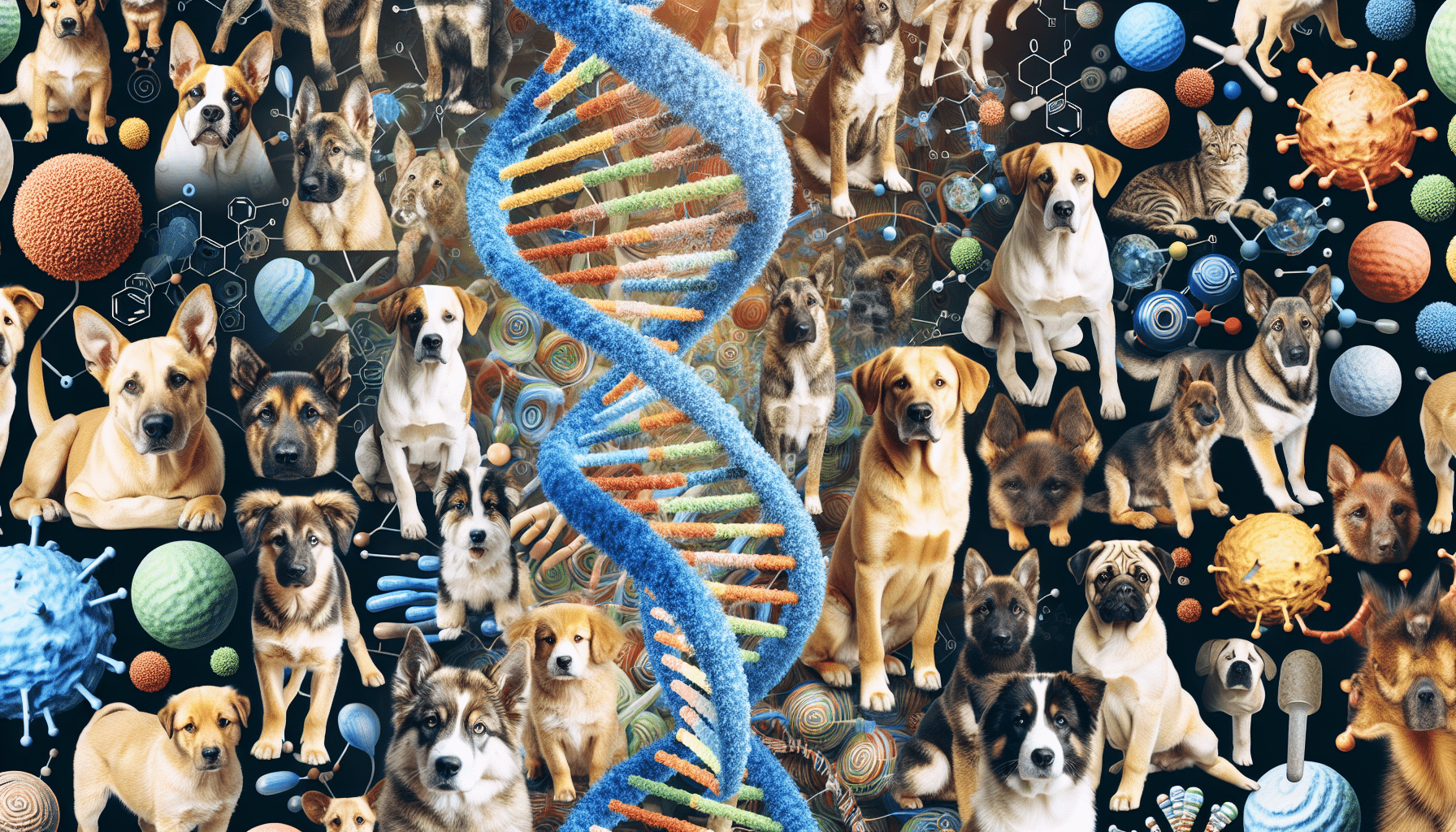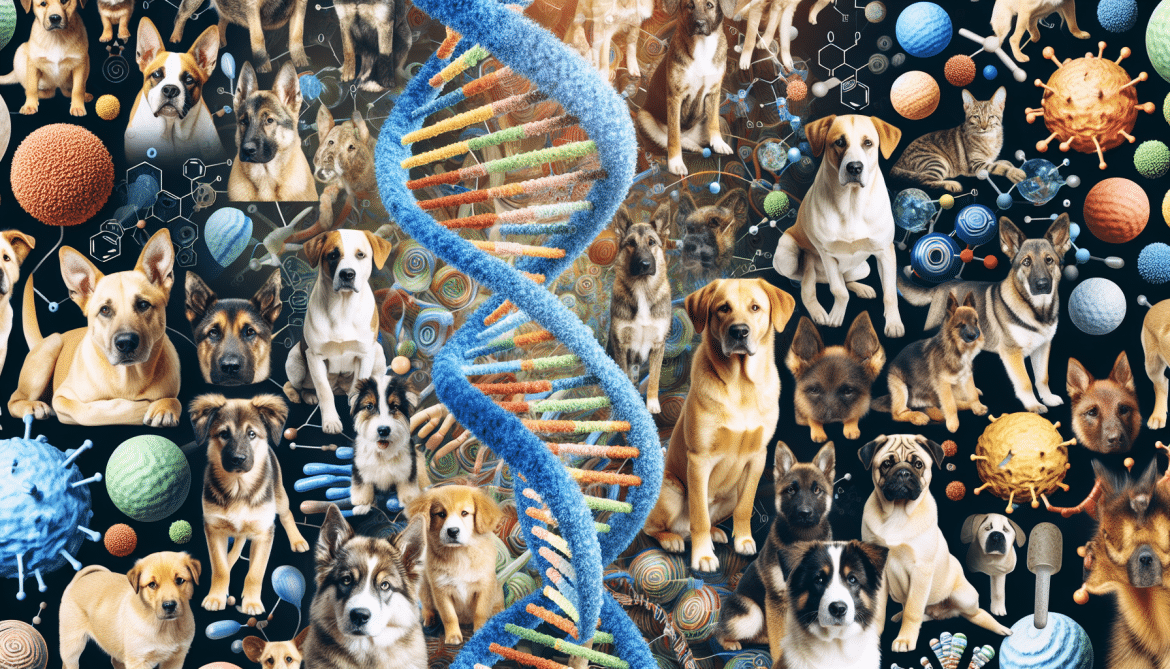If you've ever wondered why some dogs are prone to certain health issues while others seem to live long, healthy lives, the answer may lie in their genetics. Understanding the Impact of Genetics on Dog Health explores the role that genetics play in shaping a dog's overall health and well-being. As a responsible dog owner, it's important to be aware of how genetics can influence predispositions to certain diseases and conditions, so that you can take proactive steps to ensure your furry friend stays happy and healthy for years to come.

This image is property of images.pexels.com.
Understanding the Impact of Genetics on Dog Health
When it comes to the health of our beloved furry friends, genetics play a crucial role. Genetics refers to the study of genes and how they are passed down from one generation to the next. Just like humans, dogs inherit specific traits and tendencies from their parents through their genes. These genetic factors can greatly influence a dog's overall health and well-being.
What is genetics?
Genetics is the branch of science that focuses on the study of genes, heredity, and variation in organisms. Genes are segments of DNA that carry instructions for the development and functioning of living beings. They are like the blueprint that determines how an individual will look, behave, and function. In dogs, genetics plays a vital role in determining their physical appearance, temperament, and susceptibility to certain diseases.
How does genetics influence dog health?
Genetics can have a profound impact on a dog's health in several ways. It determines their susceptibility to certain diseases, their physical characteristics, and even their behavior. Responsible breeding practices aim to maintain and improve the health of a breed by selecting for desirable traits and minimizing the risk of inherited diseases.
Inherited Diseases and Genetic Disorders
Inherited diseases are conditions that are passed down from parents to their offspring through their genes. Dogs, just like humans, can be prone to a variety of inherited diseases and genetic disorders. These conditions can range from mild to severe and can impact a dog's quality of life.
Common inherited diseases in dogs
There are numerous inherited diseases that affect dogs, and they can vary depending on the breed. For example, hip dysplasia is a common inherited disease in large breeds such as German Shepherds and Labrador Retrievers. Other prevalent genetic diseases include progressive retinal atrophy (PRA), cancer, heart diseases, allergies, and epilepsy.
Understanding genetic disorders
Genetic disorders are conditions caused by abnormalities or mutations in specific genes. These mutations can affect the normal functioning of the gene, leading to various health problems. Some genetic disorders in dogs are breed-specific, while others can occur across multiple breeds. Genetic testing can help identify these disorders, allowing owners and breeders to make informed decisions regarding breeding and healthcare.
Identifying genetic markers for diseases
Advancements in genetic research have allowed scientists to identify specific genetic markers associated with certain diseases in dogs. Genetic markers are specific variations or mutations in the DNA sequence that are associated with an increased risk of developing a particular disease. By identifying these genetic markers, veterinarians and breeders can implement preventive measures and develop targeted treatments for affected dogs.

This image is property of images.pexels.com.
Breed-Specific Health Issues
Different dog breeds have different predispositions to specific diseases. These breed-specific health issues are often a result of genetic factors and can vary widely from breed to breed.
Breed predispositions to certain diseases
Certain breeds are more prone to specific health issues due to their genetic makeup. For example, brachycephalic breeds like Bulldogs and Pugs are more susceptible to respiratory problems due to their shortened airways. Other breeds, like the Golden Retriever, have a higher incidence of developing cancers such as lymphoma. Understanding these breed predispositions can help owners and breeders take appropriate measures to prevent or manage these conditions.
Genetic testing for breed-specific health issues
Genetic testing can play a crucial role in identifying breed-specific health issues. Breed-specific genetic tests can detect the presence of specific gene mutations or markers associated with diseases prevalent in certain breeds. By identifying these genetic markers, breeders can make informed decisions regarding which dogs to breed, reducing the risk of passing on these health issues to future generations.
Health implications of crossbreeding
Crossbreeding, or mixing different breeds, can sometimes result in healthier offspring. This is because crossbreeding can introduce genetic diversity, reducing the likelihood of inheriting breed-specific health issues. However, it is important to note that crossbred dogs can still inherit health problems from their parent breeds. Responsible crossbreeding should involve health testing of both parents to ensure a healthier outcome.
The Role of DNA and Genes
DNA, or deoxyribonucleic acid, is the genetic material responsible for the inheritance of traits from one generation to the next. Genes are segments of DNA that carry the instructions for the development and functioning of an organism. Understanding the role of DNA and genes is essential in comprehending how they influence dog traits and health.
How DNA influences dog traits and health
DNA controls the physical and behavioral traits of a dog by providing the instructions for protein synthesis. Different genes determine various characteristics such as coat color, size, temperament, and predisposition to certain diseases. Mutations or alterations in specific genes can lead to variations in these traits or an increased risk of developing certain health conditions.
Identifying disease-causing genes
Scientists and researchers have been able to identify specific genes responsible for causing certain diseases in dogs. By pinpointing these disease-causing genes, veterinarians and breeders can better understand the inheritance patterns and develop strategies to reduce the occurrence of these diseases in certain breeds. This knowledge can also lead to the development of targeted therapies and treatments for affected dogs.
Genetic mutations and their impact on health
Genetic mutations are changes or alterations in the DNA sequence that can affect the normal functioning of genes. These mutations can be either beneficial, neutral, or harmful. Harmful mutations can lead to various health problems in dogs, including but not limited to metabolic disorders, neurological conditions, and immune system disorders. Identifying these mutations is crucial in understanding the genetic basis of diseases and designing appropriate interventions.

This image is property of images.pexels.com.
Genetic Testing in Dogs
Genetic testing has revolutionized the field of veterinary medicine, allowing for the detection of genetic variations and disease predispositions in dogs. These tests can provide valuable information about a dog's genetic profile, enabling owners and breeders to make informed decisions regarding their health and breeding programs.
Types of genetic tests available for dogs
There are different types of genetic tests available for dogs, ranging from breed-specific tests to tests that screen for a wide range of conditions. Breed-specific tests are designed to identify genetic mutations that are prevalent in a particular breed. For example, certain breeds are prone to progressive retinal atrophy, and there are specific tests to detect the mutations associated with this condition. Other tests can evaluate a dog's risk for developing multiple diseases, such as cancer or certain types of heart conditions.
Benefits of genetic testing
Genetic testing offers numerous benefits to dog owners and breeders. It can provide valuable information about a dog's risk for developing certain diseases, allowing for early intervention and preventive measures. Genetic testing can also help breeders make informed decisions when selecting breeding pairs, reducing the risk of passing on genetic diseases to future generations. For owners of mixed-breed dogs, genetic testing can provide insights into their genetic background, helping them understand potential health risks and tailor their care accordingly.
Limitations and challenges of genetic testing
While genetic testing has its advantages, it also comes with limitations and challenges. Some genetic tests may not be able to detect all potential disease-causing mutations, and false negatives or false positives can occur. Additionally, the interpretation of test results can sometimes be complex, requiring expertise and counseling to fully understand what the results mean for a dog's health. It is essential to work closely with veterinarians and genetic counselors to ensure accurate interpretation and appropriate actions based on the test results.
Selective Breeding and Genetic Health
Selective breeding is the practice of intentionally mating dogs with desired traits to produce offspring with those specific traits. While selective breeding can be used to improve breed standards and desirable characteristics, it also plays a crucial role in maintaining and improving the overall genetic health of a breed.
Balancing desired traits with health concerns
When engaging in selective breeding, it is important to strike a balance between desired traits and potential health concerns. Breeders must consider the hereditary health issues associated with certain traits and aim to minimize the risk of passing on diseases or genetic disorders to future generations. By prioritizing health alongside desirable traits, breeders can ensure the long-term genetic health and well-being of the breed.
Ethical considerations of selective breeding
Selective breeding raises ethical considerations, as it involves deliberately manipulating the genetic material of animals for human purposes. It is essential for breeders to prioritize the welfare of the dogs involved in the breeding process and ensure that they are not subject to unnecessary suffering or health issues. Responsible breeding practices should aim to improve breed health while avoiding harmful genetic mutations and reducing the incidence of inheritable diseases.
Improving breed health through responsible breeding
Responsible breeding practices can greatly contribute to the improvement of breed health. This includes conducting thorough health screenings and genetic tests on potential breeding dogs to identify any potential health concerns. By carefully selecting breeding pairs based on their health, temperament, and genetic profile, breeders can work towards improving the overall wellness and longevity of the breed.

Genetic Counseling for Dog Owners
Genetic counseling plays a vital role in assisting dog owners in understanding the genetic risks and health implications for their canine companions. Genetic counselors provide valuable insights and guidance to help owners make informed decisions regarding breeding, healthcare, and management of their dogs' genetic health.
Importance of genetic counseling
Genetic counseling is essential for dog owners as it provides them with a deeper understanding of their dog's genetic risks and the potential impact on their health. Genetic counselors can explain the results of genetic tests, discuss the implications of certain genetic mutations or markers, and provide guidance for managing and preventing genetic diseases. Their expertise can help owners navigate complex genetic information and make informed decisions for their dogs' well-being.
Accessing genetic counseling services
Several veterinary clinics and specialized genetic testing laboratories offer genetic counseling services for dog owners. Owners can consult with these professionals to discuss their dog's genetic health, receive advice on breeding decisions, and gain a better understanding of their dog's overall health risks. Working with a genetic counselor can provide peace of mind and ensure that owners are equipped with the knowledge needed to provide the best care for their dogs.
Understanding genetic counseling reports
Genetic counseling reports provide a comprehensive overview of a dog's genetic health and risks. These reports typically include information about genetic mutations, disease predispositions, and recommendations for preventive measures or further testing. It is crucial for owners to thoroughly review and understand these reports, seeking clarification from a genetic counselor or veterinarian if needed. This will enable owners to take appropriate actions to safeguard the health of their dogs.
Genetic Diversity and Population Health
Genetic diversity, or the variety of genetic material within a population, plays a crucial role in maintaining the overall health and resilience of dog populations. Limited genetic diversity can lead to a higher risk of inherited diseases and reduced adaptability to environmental changes.
The impact of limited genetic diversity
Inbreeding and over-reliance on popular sires can lead to limited genetic diversity within a breed. Limited genetic diversity increases the risk of inheriting genetic diseases and reduces the ability of the population to adapt to changing environmental conditions. It can also result in reduced fertility, weaker immune systems, and increased susceptibility to contagious diseases.
Dangers of inbreeding and popular sire syndrome
Inbreeding, or mating closely related individuals, can concentrate harmful genetic mutations within a breed. This increases the likelihood of offspring inheriting these mutations and developing associated health problems. Similarly, the popular sire syndrome, where a single influential male is extensively used for breeding, can also reduce genetic diversity and increase the risk of inherited diseases.
Promoting genetic diversity in dog populations
Promoting genetic diversity is essential for maintaining the long-term health and viability of dog populations. Responsible breeding practices, such as outcrossing and incorporating dogs from diverse lineages, can help introduce new genetic material and reduce the risk of inherited diseases. Breeding programs that encourage genetic diversity, while still maintaining breed standards and desired traits, contribute to the overall well-being and sustainability of dog populations.

Environmental Factors vs. Genetics
While genetics has a significant impact on a dog's health, it is important to acknowledge the role of environmental factors in influencing their well-being. Environmental factors can interact with genetic predispositions, either exacerbating or mitigating the risk of certain diseases or health conditions.
Understanding the influence of environment on health
Environmental factors encompass everything from diet and exercise to exposure to toxins, pollutants, and infectious agents. These factors can have a direct impact on a dog's physical health and can also influence gene expression, either turning genes on or off. A healthy and supportive environment, along with responsible pet care practices, can contribute to the overall well-being of a dog.
Interplay between genetics and environment
Genetics and the environment do not work in isolation but rather interact and influence each other. While genetics can determine a dog's susceptibility to certain diseases, the environment can play a role in triggering or aggravating those conditions. For example, a dog with a genetic predisposition to allergies may develop symptoms more severely if exposed to environmental allergens such as pollen or dust mites.
Genetic predispositions and environmental triggers
Genetic predispositions, combined with certain environmental triggers, can increase the risk of various health conditions in dogs. For instance, certain breeds may be genetically predisposed to skin allergies, and exposure to allergens in the environment can exacerbate these symptoms. Understanding the interplay between genetics and the environment allows owners to take proactive measures to reduce environmental triggers and provide appropriate care for their dogs.
The Future of Canine Genetic Research
The field of canine genetic research continues to advance rapidly, paving the way for exciting developments in understanding and managing dog health. As technologies continue to evolve, the future holds great promise for personalized medicine and tailored healthcare for our canine companions.
Advancements in genetic technologies
Advancements in genetic technologies, such as next-generation sequencing and genome-wide association studies, have revolutionized our understanding of canine genetics. These technologies allow for more comprehensive testing and analysis of an individual dog's genetic material, providing a deeper understanding of their health risks and potential genetic diseases.
Identifying new genetic markers
Ongoing research efforts are focused on identifying new genetic markers associated with various diseases and traits in dogs. By expanding our knowledge of the genetic basis of diseases, veterinarians and researchers can develop targeted therapies and preventive measures to improve the health and quality of life for dogs.
Potential for personalized medicine in dogs
With the advancements in genetic research, there is growing potential for personalized medicine in dogs. By analyzing a dog's genetic profile, veterinarians can tailor treatments and preventive strategies to their specific needs. Personalized medicine allows for more effective and efficient healthcare, ultimately improving outcomes and well-being for individual dogs. However, it is important to acknowledge ethical considerations and ensure that personalized medicine is used responsibly and in the best interest of the dog.
In conclusion, understanding the impact of genetics on dog health is essential for dog owners, breeders, and veterinarians. Genetics influence a dog's susceptibility to inherited diseases, their physical characteristics, and their overall well-being. Responsible breeding practices, genetic testing, and genetic counseling help mitigate health risks and improve the genetic health of dog populations. By considering both genetics and environmental factors, owners can provide the best care and support for their canine companions. Continued advancements in genetic research offer exciting possibilities for personalized medicine and a brighter future for the health and well-being of dogs.


